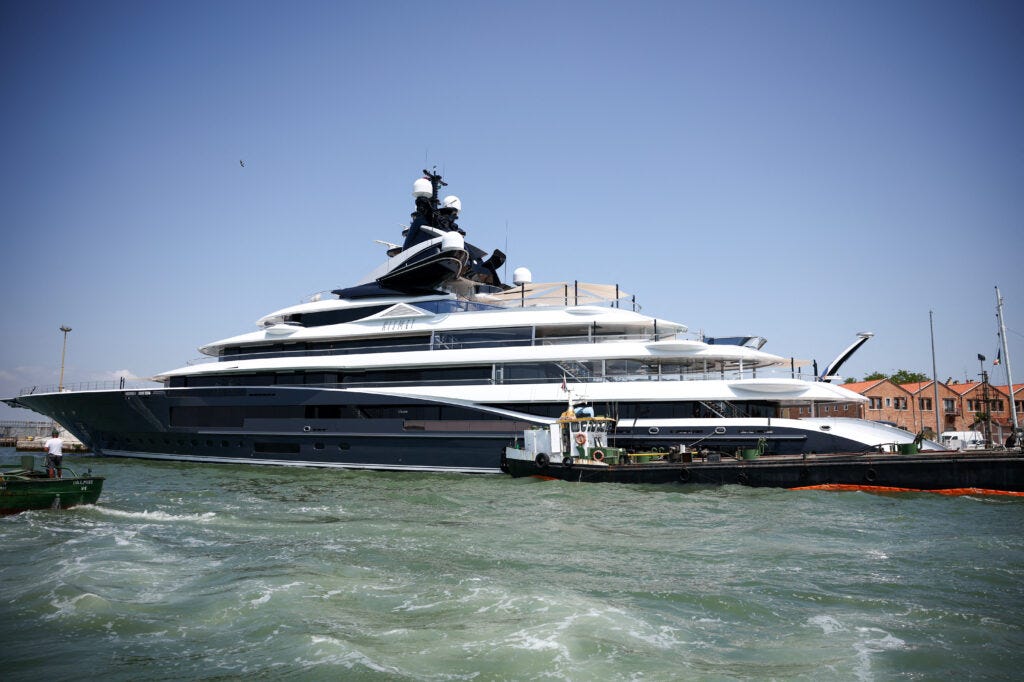If I were as wealthy as Jeff Bezos, I would use that money for good, not for a wedding.
Don’t get me wrong—I love love. I’ve had two weddings of my own. Both were small. At the last one—the one that took—it was just me and John in the office of a Justice of the Peace. It lasted maybe five minutes. We didn’t have a live band or a champagne tower or matching embroidered linen napkins. There was no reception. We had each other, and we had a sense that love—real love—isn’t about the production. It’s about the promise.
So when I see billionaires spending tens of millions of dollars on a single day, I can’t help but feel something twist in my chest. Not envy—disappointment. Disappointment in the missed opportunity. Disappointment in the imagination so narrowly focused on opulence and optics when it could be focused on something so much bigger than a wedding: a world.
If I had the kind of money Jeff Bezos has—the kind of money that’s impossible to even fully comprehend—I wouldn’t need a $500 million dollar yacht to feel joy. I wouldn’t need imported orchids or 400 security guards or $20,000 centerpieces. I wouldn’t want to see my wealth manifest in spectacle. I’d want to see it manifest in service.
And so when I see a billionaire spending tens of millions of dollars on a single event—on fireworks over the Mediterranean and yachts longer than city blocks, on designer dresses flown in on private jets and custom-built stages and exclusive musical acts—I can’t help but think about the other side of the world. The other side of the city. The other side of the street. Where someone is rationing insulin. Where someone is sleeping in their car. Where someone is walking five miles to a job that still doesn’t pay enough to make rent. Where the celebration is just another reminder that they are not invited to the feast.
If I were as wealthy as Jeff Bezos, I wouldn’t need a wedding. I would need a conscience. A compass. A map toward a different kind of abundance. One that doesn't glitter, but grows.
Because I know what it’s like to be broke. I’ve clipped coupons. I’ve paid bills late because something had to give. I’ve walked through food banks and public health clinics and known the quiet, shattering dignity of asking for help. And I’ve seen people I love fall through the cracks of a system that was never designed to catch them. So no—if I were that wealthy, I wouldn’t be throwing a lavish wedding. I’d be throwing out lifelines.
I'd start close to home. I'd fund shelters not just to house people for a night, but to help them rebuild their lives. I’d buy up failing motels and turn them into transitional housing with onsite counselors, child care, hot showers, and community gardens. I'd make sure that no woman escaping abuse had to choose between homelessness and danger.
I’d invest in education—not just shiny tech or glossy buildings, but in teachers. I’d pay them what they’re worth and then some. I’d erase student lunch debt. I’d send books to every child who lives in a book desert. I’d fund early childhood programs where joy and play and literacy are wrapped up together.
And I’d go bigger. Because I could. Because it would be wrong not to. I’d help repair what’s been broken in this country for far too long: racial wealth gaps, environmental devastation, rural hospital closures. I’d pour money into health clinics, clean water infrastructure, and mental health support in every zip code, not just the ones that vote a certain way or look a certain way.
Because when you have that kind of money, you have a choice: You can build a golden cage for yourself, or you can build a bridge for others.
With Bezos-level wealth, I’d start by listening. Really listening—to nurses, teachers, farmers, social workers, people who’ve been waiting not for charity, but for change. I’d fund their ideas. I’d trust their knowledge. I’d hand them the microphone, the pen, the checkbook. I wouldn’t lead with ego—I’d follow with humility.
I would rebuild what’s been neglected. Rural hospitals, crumbling schools, water systems that poison instead of nourish. I would buy back stolen time—pay off medical debt, cancel predatory loans, fund parental leave policies so that no mother has to choose between healing and keeping the lights on. I would invest in poets and public parks, because I believe in beauty as a form of justice, too.
And I would be transparent. No shadow foundations, no quiet tax havens. I’d open the books. I’d tell the truth: that hoarding this kind of money is a moral failure. That in a world this interconnected, one man’s indulgence is another child’s unmet need. I would not wear wealth like armor. I would not ask the world to pretend I’d earned every cent through merit alone. I would say plainly: I was lucky. I had help. And now, I have a responsibility.
Some people argue that billionaires deserve to spend their money however they want. That it’s their reward for innovation, for risk. But what risk is there, really, in a system designed to reward accumulation over care? What innovation is there in building rockets while people can’t afford roofs?
If I were as wealthy as Jeff Bezos, I would not celebrate with fireworks—I’d put out fires. Not just literal ones, though the forests are burning, yes. But the quiet fires too—the kind that smolder in exhausted parents, in empty pantries, in overdrafted accounts, in futures that feel closed off before they begin.
I’d be less concerned with legacy and more concerned with repair. With using money not as a monument to myself, but as a tool to lift others. I’d want to fund a world where no one needs to be rescued by philanthropy because the systems themselves are just.
A wedding is lovely, but it is not holy. Not compared to justice. Not compared to a world in which we all get to say yes—to rest, to care, to dignity, to possibility.
If I were as wealthy as Jeff Bezos, I wouldn’t spend it on a wedding. I’d spend it on all the ways love shows up after the party: in clean water, in affordable housing, in food security, in books and ballots and broadband. In the kind of world where no one is disposable and everyone is seen.
Because in the end, a good marriage is built not on extravagance, but on attention. And a good world—well, that’s built the same way.
I’ve never been rich, but I’ve been loved deeply. And I’ve learned that the things that matter most aren’t purchased—they’re practiced. Kindness. Justice. Compassion. If I were a billionaire, I’d want to spend that wealth in a way that reflects my deepest values, not my status. I’d want my money to tell the story of who I am—not in headlines about celebrity guests or what designer I wore, but in quiet revolutions of dignity and care.
If I were as wealthy as Jeff Bezos, I wouldn’t be planning a $50+ million dollar wedding. I’d be planning a legacy. Not a temporary spectacle, but a permanent shift. Not a lavish night—but a livable future.
Love,
Patti






I read this with the "If you give a mouse a cookie..." kind of cadence. It makes me feel some kinda way that no emoji could ever represent and maybe could not accurately be named. A mix of deep sadness, disgust, angst mixed with a quiet whisper of rebellion that says don't give up. He is boring. He is unimaginative. He is no color in this world of rainbow possibility. He is exactly the opposite of whatever he thinks he is. He can't get out from under is very own personal never ending pile of Amazon boxes. He is as bland as the brown of those cardboard boxes. As vapid as the inside of one of those boxes.
Sadly, I imagine he just did spend the money on his deepest values.